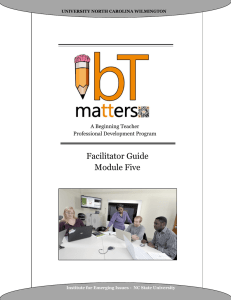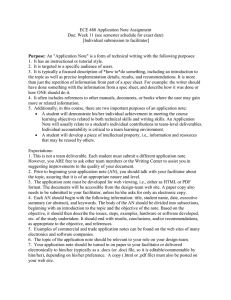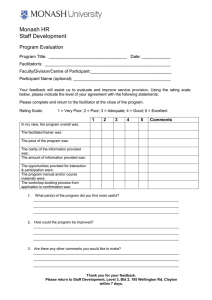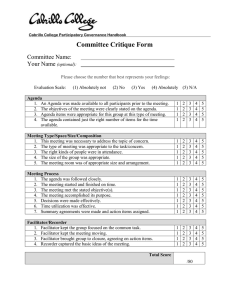Effective Small Group Learning
advertisement
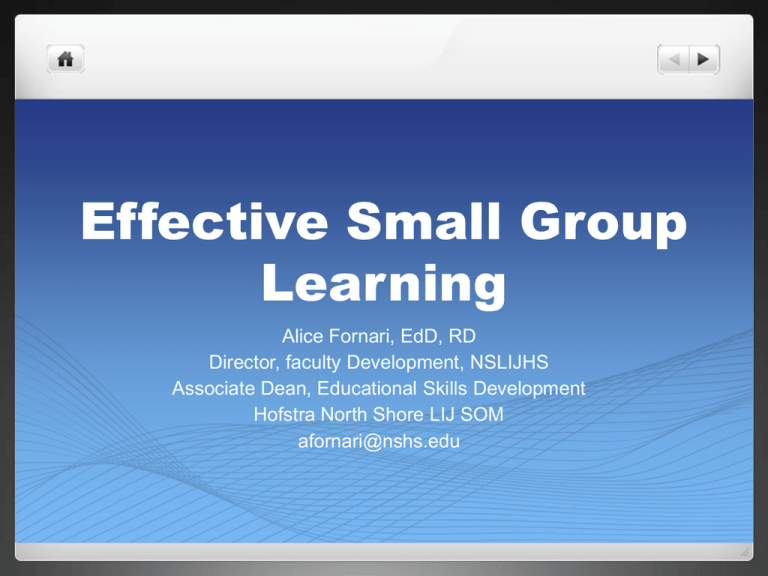
Effective Small Group Learning Alice Fornari, EdD, RD Director, faculty Development, NSLIJHS Associate Dean, Educational Skills Development Hofstra North Shore LIJ SOM afornari@nshs.edu Learning Objectives Upon completion of the session the participants will: Recall the principles of small group facilitation Value the importance of pre-work Participate in a small group with a facilitator Identify learning form the small group discussion Debrief the challenges of small group faciltiation Ice Breaker Question On a scale of 1 to 5 (1 not at all and 5 ready) : How prepared are you to facilitate a small group discussion? AGENDA Review key principles of small group facilitation (15 minutes) Divide into groups of 6-8 students (5 minutes) Select a facilitator for small group discussion Read article (pre-work) for assigned topic (10 minutes) Facilitator prepare to start the discussion with group, what is the techniques to start the discussion? (5 min) Begin the group learning process (15-20 min) Debrief process as a large group (15 min) followed by Q and A (10 min) Preparation What do I want students to learn? How do I want them to learn it? Is pre-work required? How will I know if they learned it? Why Small Group Learning Constructive discussions Appropriate and effective questions Higher order thinking/reasoning/problem solving Foster interpersonal interactions (peers and faculty) Principle of Small Group Design Interaction among those in the group 6-8 is best # Leadership and learning shared by members of the group Benefits Development of discussion skills and thinking Exploration of attitudes Sharing of experiences Reflection on experiences Note: these benefits on dependent on the skills of faculty and students Core Discussion Skills Asking questions Listening Responding Explaining Opening and Closing Preparation (pre-work completion) Cognitive Skills of Students Increased understanding Critical thinking Reasoning Problem solving Decision making Creative thinking Supports: Teamwork/leadership Collaborative learning Developing communication competency Asking Questions Arouse interest and curiosity Assess knowledge Critical thought and evaluation Initiate, sustain and direct a conversation Types of Questions: Narrow-broad Recall-thought Confused-clear Encourage-threaten Listening (as a facilitator) Surveying/Multiple opinions Sorting/Distinguishing points Searching/New Information Studying/Group Process Note: important to be able to listen and not respond readily Responding (as a facilitator) Challenge vs. Support Fear of criticism vs. a safe learning environment Reflecting back-encourages elaboration Perception checking-check understanding Paraphrasing-using own words Silence- “let us spend a minute thinking about that” Explanation Clarity and fluency-defining new terms, avoiding vagueness Emphasis and interest-tone Using examples-use student responses Organization-linking words Feedback-check for understanding Note: Best in summary of a session to avoid passivity and early closure Opening the Session R-establish rapport E-discuss mutual expectations for faculty and students Aims & Purpose of the session are clear S-State structure of the course/session T-Relevant task and provide feedback on the task Closing the Session Summary of key points Identify linkages Identify unanswered questions-next steps Point out what was achieved-knowledge & group process Encourage self-assessment of individual’s role in group Thank the group for discussion Common Errors Each student contributes their own point of view, with little relationship to the others or overall context (monologue) The discussion is a one-to-one conversation or a series of Q &A between faculty and students Facilitating Methods Plan the seating arrangements Pose a problem or question Allow think time Foster student to student discussion Techniques Buzz groups (think-pair-share) Snow balls Jigsaws Fishbowls Concept maps Brainstorming Note: decide if you need a small plenary as an opening or summary Research Success depends on the skill sand motivation of the faculty and to a lesser extent on the skills and motivation of the students Effectiveness is dependent on how the method is used Dynamics of Groups Forming-requires more direction Norming-developing a mutual understanding Storming-rebellion or disagreement/controversy Performing-commitment and productivity Note: Reflect on learning process and not just be task oriented; promote cooperation vs. competition Evaluation Types Processes How did the group perform today? Product Formative What was learned today What is unclear? How to collect data? Qualitative/Quantitative Students/facilitator/peers Summary Faculty and students have roles that overlap: TO PREPARE TO DISCUSS… TO THINK … TO REFLECT… Summary-continued Prepare the learning environment Provide a structure that is friendly and focused keep discussion moving forward Summarize discussions and develop student thinking Students contribute to discussions in a thoughtful way ask questions and provide comments but not conclusions Summary Question On a scale of 1 to 5 (1 not at all and 5 ready) : How prepared are you to facilitate a small group discussion? One-minute paper
